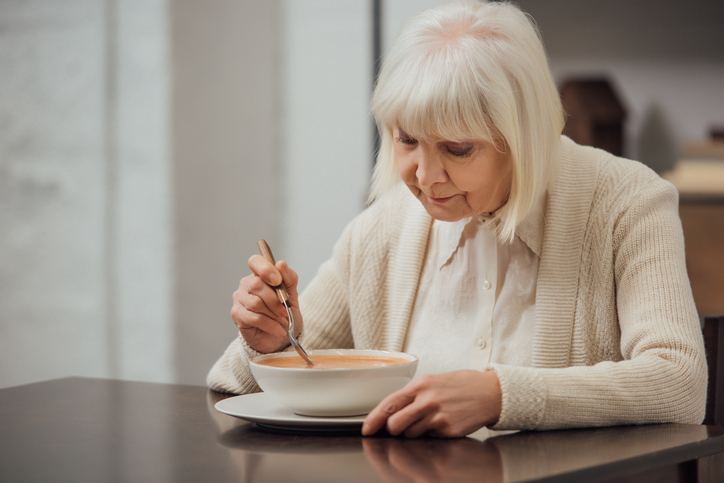
Understanding loss of appetite in older adults is important for family caregivers.
You have just made a huge batch of Mom’s special chili recipe. Your house smells delicious, and you cannot wait to eat. However, while you are delighting in not only the taste but the memories the meal conjures, Mom is simply stirring the food around in her own bowl. And it’s not the first time. Recently, her desire for food has been decreasing, and it’s starting to alarm you.
Understanding Loss of Appetite in Older Adults
To understand loss of appetite in older adults, it’s important to know that it’s not uncommon and can result from numerous reasons, including:
- Loneliness and having no one to share meals with
- Dehydration
- Difficulty with preparing meals
- A routine that doesn’t include regular mealtimes
- Depression and/or grief
- A sedentary lifestyle
- Problems with chewing, swallowing, or self-feeding
- Feeling as though they’ve lost control over other aspects of life
- Loss of taste or smell, making food less appealing
It’s crucial to first talk with the person’s health care provider and dentist to rule out any health issues or medication side effects that could be causing the issue. When it is confirmed that there is not a clinical basis for the change in appetite, try these strategies to help restore the person’s enjoyment in eating.
- Offer high-calorie foods in small amounts. In place of three large meals each day, try smaller portions more frequently. You can still make larger quantities of favorite meals, dividing them up into individual helpings that may be frozen and reheated. Other foods to try that will provide necessary nutrients include cheese, peanut butter or other nut butters, finely chopped eggs or meat, avocado, yogurt, diced fruit, and whole milk.
- Incorporate softer options. During the summer when fresh fruit is particularly tasty, try blending up some healthy smoothies. Summer can also be a great time for milk shakes, ice cream, and frozen yogurt. Make it even more festive and fun by inviting family members over to make their own unique treats and enjoying them outdoors together.
- Create a schedule. Rather than waiting until the person says they’re hungry, set designated times each day and adhere to a routine for meals. It might take some experimentation to discover the best schedule, but give the new routine time to work before tweaking. Make sure the individual’s routine includes plenty of physical activity and exercise as well, which helps to increase appetite.
- Modify foods and utensils accordingly. If self-feeding is challenging, there are a variety of adaptive utensils to explore. You can also make mealtimes easier by serving food that is cut into small, bite-size portions, as well as finger foods like sandwiches, fish sticks, string cheese, chicken tenders, etc.
Grace Home Care is here to help family caregivers get a better understanding of loss of appetite among seniors and assist older adults in overcoming hurdles to eating healthy. We can prepare nutritious meals and snacks, offer motivation to stay physically active, and provide friendly companionship during mealtime to make it more fun. Give us a call at 785-286-2273 or reach out to us online for more information on our home care services and how we can help someone you love in Topeka.
